
Delhi is shrouded in a thick yellow smog, making it increasingly difficult for residents to breathe comfortably. As of Monday morning, the city's Air Quality Index (AQI) stands at a hazardous 481, placing it firmly in the 'severe plus' category. Amidst the deteriorating air quality, authorities have imposed anti-pollution measures under Stage IV of the Graded Response Action Plan (GRAP), a set of guidelines and measures to reduce air pollution in the National Capital Region (NCR) of India. The Commission for Air Quality Management (CAQM) issued the order as AQI worsened. This plan is activated when AQI reaches an alarming level. Here’s a look at the restrictions and tips to protect yourself from hazardous air pollution.
Table of Content:-
Also Read: Delhi Air Pollution: Air Quality Remains 'Very Poor' as AQI Soars Past 500 in NCR
What Is Banned Under GRAP-IV?

Under GRAP-IV, the following restrictions have been imposed to combat severe air pollution:
- Diesel-powered medium and heavy goods vehicles registered in Delhi (BS-IV or below) are prohibited, except those transporting essential goods.
- Non-essential light commercial vehicles from outside Delhi are allowed entry only if they run on CNG, BS-VI diesel, or are electric.
- Trucks carrying non-essential items are barred from entering Delhi unless powered by LNG, CNG, or BS-VI diesel.
- The Commission for Air Quality Management (CAQM) panel recommends shifting classes 6–9 and class 11 to online mode.
- Offices in NCR are advised to operate at 50% capacity, with the remaining staff working remotely.
How Prolonged Air Pollution Exposure Affects Your Health

In an interaction with the OnlyMyHealth team, Dr Padma Sundaram, Consultant-Pulmonologist and Sleep Specialist , Fortis Hospital, Cunningham Rd., Bengaluru, suggests that long-term exposure to air pollution causes various respiratory symptoms, increasing medication reliance, and reducing lung function, especially in individuals with asthma or bronchitis.
He says that air pollution can trigger acute attacks, hospitalisations, and increased mortality risk in vulnerable groups of people, necessitating proactive management.
Poor air quality in urban areas can trigger respiratory illnesses such as Chronic Obstructive Pulmonary Disease (COPD), pneumonia, bronchitis, asthma, and lung cancer, as well as worsen existing conditions.
Also Read: Are Your Kids Breathing Toxic Air? How Poor AQI Impacts Learning And Memory In Children
Tips To Protect Yourself From Severe Air Pollution

To protect yourself from severe air pollution, it is crucial to take some immediate measures. These include:
- Wearing a well-fitted N95 mask
- Staying indoors during peak pollution hours
- Avoiding strenuous outdoor activities
- Using good-quality air purifiers
- Monitoring AQI daily
- Maintaining good hygiene practices, such as frequent handwashing
Conclusion
As Delhi's air quality worsens, it is essential to follow government guidelines and take necessary precautions to protect your health and that of your loved ones. Minimise outdoor activities, and if stepping out is unavoidable, wear a proper mask, such as an N95. Prolonged exposure to poor air quality can severely impact lung and respiratory health, particularly for individuals with pre-existing conditions. Those in vulnerable groups, such as children, the elderly, and those with chronic illnesses, should stay in regular contact with their doctors and seek immediate medical advice in case of any complications.
Also watch this video
How we keep this article up to date:
We work with experts and keep a close eye on the latest in health and wellness. Whenever there is a new research or helpful information, we update our articles with accurate and useful advice.
Current Version